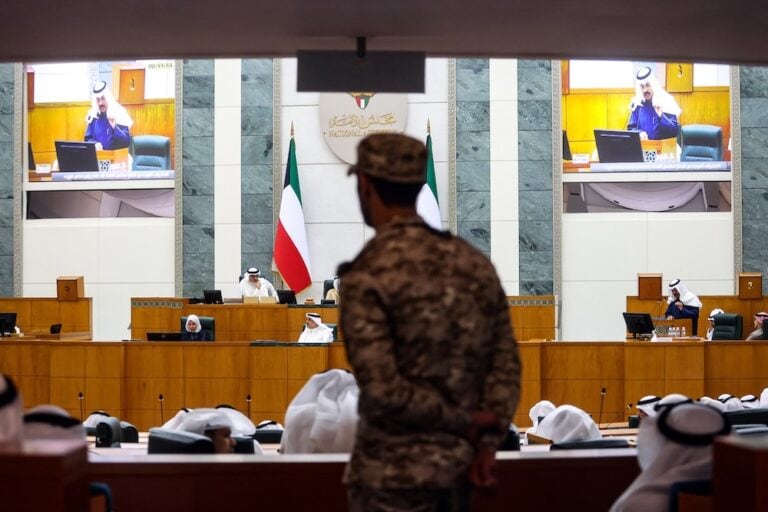Muhammad Abd al-Qadir al-Jasim was arrested on 22 November 2009 on charges of libel and slander.
(Human Rights Watch/IFEX) – Kuwait City, November 24, 2009 – The prosecutor-general should immediately order the release of Muhammad Abd al-Qadir al-Jasim, a lawyer and journalist who is a prominent critic of the government, Human Rights Watch said today.
Al-Jasim was arrested November 22, 2009, on charges of libel and slander. The arrest was apparently the result of criticisms he allegedly made about Prime Minister Shaikh Nasir al-Muhammad al-Ahmad al-Sabah’s policies at a private gathering more than a month ago, Al-Jasim’s lawyer said.
“Locking up apparently peaceful government critics for remarks (made) at a social gathering certainly undermines Kuwait’s image as one of the freest countries in the region,” said Sarah Leah Whitson, Middle East director at Human Rights Watch.
The prime minister faces rare parliamentary questioning on December 8 over his personal expenditures and that of his office.
Jasim’s lawyer, Abd al-Karim Haidar, told Human Rights Watch that al-Jasim reported to the General Prosecution department in Salmiya, Kuwait city, on November 22, in response to a summons. Prosecutors did not tell him specifically what acts he was alleged to have committed in violation of the law. Al-Jasim refused to answer their questions.
Instead they sent al-Jasim, who was accompanied by his lawyers, to the Interior Ministry’s Criminal Investigation Department with a sealed envelope. When officers there opened the envelope, it contained a detention order from General Prosecution setting bail at 1,000 Kuwait Dinars (US$3,500), but it did not contain a written charge, his lawyers said. He refused to pay the bail, and was detained.
Abdullah Ahmad, another lawyer for al-Jasim who accompanied him to both the prosecution and the criminal investigation departments, told Human Rights Watch that prosecutors told al-Jasim only that he was accused of “libel and slander” of the prime minister for remarks he allegedly made on October 18 in a group of about 20 people in Rawdha, near Kuwait City, at the ‘Ulayyan family’s diwaniyya – a social gathering at a private home where politics are sometimes discussed.
The prime minister filed a criminal complaint against al-Jasim around November 19, al-Ahmad said. He said that a representative of the prime minister had videotaped the ‘Ulayyan family’s social gathering, according to al-Jasim.
A statement by al-Jasim’s lawyers on his website says that discussion at the gathering revolved around “public affairs and criticism of government policies.” In separate cases in October 2009, courts fined two Kuwaiti members of parliament 3,000 KD each for slander, one over criticisms he made regarding the Interior Ministry’s treatment of the Bidun, a large group of stateless people in Kuwait, and the other for remarks he had made about corruption in the health system.
Kuwait maintains libel and slander as criminal offenses in articles 209 and 210 of its criminal code, with a maximum prison sentence of two years, Haidar said.
Criminalizing peaceful speech, whatever the content of criticism or the persons concerned, is contrary to the right to freedom of expression. Persons who believe that the speech of others has damaged their reputation may have recourse to the civil courts to seek compensation, but the threshold for tolerating criticisms of government officials should be higher than for ordinary persons, Human Rights Watch said.
“A prime minister should accept that he will be criticized, and not resort to repressive articles of the criminal code to silence his critics,” said Whitson.


